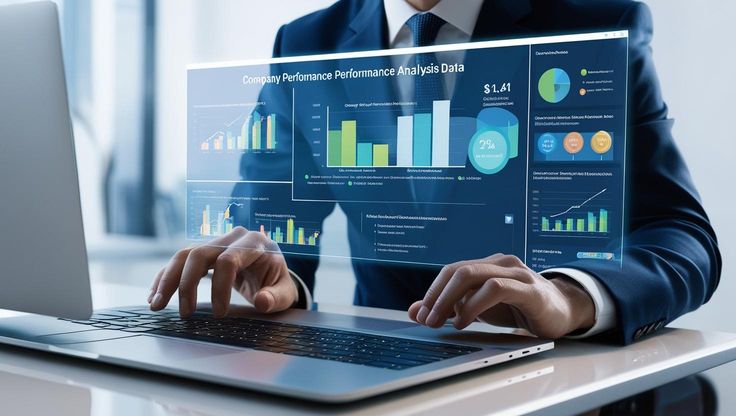Date Released
03 November, 2025
Brand valuation involves a systematic procedure for estimating the overall worth of a firm. It is evaluated on the basis of the approach adopted by a firm in establishing an estimation value procedure, considering the tangible and intangible assets. The experts should try to assess the value of a firm accurately regarding both tangible and intangible assets, such as the brand name, customer base, and goodwill. Most of the financial services carried out by any company depend on the estimation, at the truest level, of the value of a company so that business activities remain efficient. Assessment of the brand also can mean the estimation of the strength of the brand in withstanding the dynamic market environment.
What is the Importance of Brand Valuation?
Brand valuation is considered crucial for several factors. It is inevitable to the professionals to estimate the value of a brand to work effectively with the operations of businesses.
Some of the reasons why evaluating a brand’s value is considered significant are:
Financial Reporting: One of the major reasons why evaluation of brand value is considered important is because it helps in financial reporting. Estimation of the brand value will be needed so dependable financial statements, such as the income statements, balance sheets, and cash flow statements, can be drawn.
Strategic Planning: A strategy should be formulated in order to make the correct valuation of a brand. All tangible and intangible assets need to be taken into consideration and an accurate brand assessment has to be targeted.
Investor Satisfaction: The company on the basis of an accurate brand assessment can correctly assess its worth. Investors can invest money in the company on a correct valuation basis as they would take a decision on its financial reports and statements.
Monitor Performance: The brand value estimation process should monitor the performance of the strategies being implemented periodically, along with investment decisions. Regular monitoring of performance is necessary to make inferences and refine strategies.
Competitive Advantage: Determining the value of the brand provides an insight into how the company goes on financially. It helps the professionals to recommend suitable effective decisions and strategies in order to add efficiency and improve the financial performance and financial position.
Attract Investments: One of the strong reasons why brand valuation should be popular is the fact that it attracts investments. Well, the valuation has to be right so that prospective investors can pump capital into the company.
Effective Decision-Making: The process of brand value evaluation supports effective decision-making. This is because professionals can analyze the valuation process and design opportunities for increasing efficiency and effective decisions by attracting large finances, mergers, and acquisitions.
Valuable Insights: The final valuation of the brand can draw valuable insights for the professionals. It can help them put forward the interpretations for customer satisfaction, the interest of the potential investors, and other financial implications. Such insights are required in a situation where a brand basically wants to expand itself to new markets or wants to pair up with a large company.
Legal Planning: Given that brand assessment will give a proper assessment of taxes and a proper legal policy, this is very important not only for financial fitness but also for maintaining the legal policies.
Risk Assessment: Yet another reason why the value of such a brand has to be assessed is due to potential risks. The professionals can find out the possible risks and chalk out effective strategies to cut short their impact or move on with the risks.
These are some of the major reasons why brand valuation holds good importance. The professionals need to keep these points in mind and make much effort to draw a proper valuation.
What are the Challenges of Brand Valuation?
There are certain hurdles or problems faced by professionals while estimating the value of a brand. They must be able to identify these challenges and make informed steps to mitigate them.
Some of the main challenges or problems faced by professionals in the process of brand assessment are:
Intangible Assets: It becomes difficult to take into account the value of intangible assets like brand recognition, customer satisfaction, goodwill, etc. A correct valuation involves the value of both tangible and intangible assets. This becomes a challenge for professionals as the estimation of intangible assets’ value is difficult.
Market Volatility: Market fluctuations or volatility of the market is also one of the challenges of the process of valuation. These fluctuations keep on changing the values of assets and liabilities and might impact the financial process of assessing the brand’s value.
Subjective Values: The market fluctuations make the values of assets and liabilities subjective. These subjective values pose a risk to the process of brand valuation. The values keep on changing and might impact the final process of valuation. Subjectivity of assets and liabilities value might impact professionals from reaching a correct valuation of the brand.
Data Availability: Data availability is also one of the hurdles faced by professionals in the process of valuation. The whole process is dependent on data and it should be readily available. The data should be on the historical financial position of the company, customer insights, book value of assets and liabilities, etc.
Reliable Data: Another challenge along the same lines is the reliability of data. The data must be readily available and reliable to enable professionals to make mindful interpretations and generate effective strategies accordingly. This data helps potential investors invest money in the company. These are some reasons why it is essential to ensure the reliability of data before using it.
Company Evolution: The evolution of a company or the brand is also one of the challenges of brand assessment. The company keeps on changing due to introduction of new products, changing customer experience, entry into larger markets, etc. All these changes also pose a big challenge to the process of estimating the value of the brand.
Legal Complexities: Legal and regulatory complexities also pose a hurdle for professionals. They must identify the industry standards, legal policies, and other rules and regulations and adhere to them. It is essential to adhere to these laws as they promote financial stability of the business and also minimize the risk of falling into legal disparities.
Wrong Methods: The usage of wrong or ineffective tools and methodologies is also a challenge for professionals. There are different methods of estimating the brand’s value and each method gives different results. This becomes a task for professionals as they have to decide which valuation is accurate and which is not.
Technological Advancements: Technological advancements also pose a challenge to the evaluation process of brand’s value. This is because with technological advancements comes certain risks that must be mitigated or else they can severely impact the process of valuation.
Stakeholders’ Perspective: One of the biggest challenges is the stakeholders’ perspective regarding the valuation of their brand. They may not want to settle for a lesser value than what they think their company is worth. This causes conflicts between the external parties that are investors, internal staff, and stakeholders. This also becomes a problem for professionals and they must ensure harmony between the parties.
These are some of the main challenges or problems faced by professionals in the process of brand valuation. They must be able to identify these hurdles and make informed steps to mitigate them. The professionals must keep in mind the most significant challenges like technological advancements, market fluctuations, value of intangible assets, changing customer’s perspective, etc. and implement adjustable strategies accordingly.
What are the Approaches of Estimating Brand Valuation?
There are various different methods by which professionals can estimate the value of a brand. They must be experienced enough to use these methods and arrive at an accurate valuation.
These are some of the most commonly used methodologies or approaches of estimating the brand’s value:
The Income Approach: One of the most prominent ways of estimating the brand value is by using the income approach. In this approach, the future cash flows of a company are predicted and discounted to the present value. This helps in estimating the value on the basis of the income a company is likely to generate in the future. The most commonly used method in income approach is discounted cash flow (DCF) analysis.
The Market Approach: As the name suggests, the market approach relies on the market data and conditions. In this approach, professionals compare the company with similar companies of the same industry. The most commonly used method for this approach is comparable company analysis (CCA).
The Cost Approach: The cost approach is based on the costs incurred by a company to produce or replace its product. It involves taking into consideration all the related costs of brand and product development. The two most commonly used methods are reproduction cost method and replacement cost method.
These are the most common ways or approaches of estimating the brand’s value. It is essential for professionals to choose which approach suits the company best and use it for brand assessment. They must be mindful while choosing the best approach and using the most common method to calculate an accurate value of the company.
What is the Future of Brand Valuation?
There are definitely factors that will affect the future of brand valuation. At the moment, it seems like professionals and businesses will have to have huge sums of capital if they are to keep pace with these new changes and stay relevant in an aggressive and fast-moving market environment. Professionals should also begin factoring all of these major trends and understand how they could evolve in the future.
Several of these key changes influencing the future of brand valuation include:
Artificial Intelligence: Probably one of the most visible changes in valuation of brand will be the application of artificial intelligence. Artificial intelligence is going to make the often-laborious valuation process much easier. Professionals can use artificial intelligence to increase their productivity and accuracy in conducting the valuation process and also reduce time-to-valuation.
Automation of Tasks: Another change that in the future will have its effect on any valuation process is the automation of routine tasks and manual activities in order to reduce human error and increase efficiency in business operations. Routine and other manual tasks are much more in dire need of automation, so that professionals can channel their efforts towards issues of higher value. Therefore, task automation comes out to be one of the major initiatives that will enable professionals to be more productive and less burdened.
Greater Transparency: Among the platforms that shall ensure the safety and transparency between key external and internal parties. Effective communication and transparency should look to encourage all stakeholders and investors. This will ensure the harmonious business operation runs non-stop efficiently and effectively.
Better Financial Models: In the future, better financial models would be developed that would integrate real-time financial data of the company. It would prove to be accurate in results as the data is significant in the present and not historical. Such financial models would generate effective and reliable financial reports and would make the process of estimating the brand’s value easier.
Global Reach: Another key trend that will influence the future of brand value estimation is global reach. This will aid the company in entering new and larger markets and seek access to another customer base. The professionals will then have to concentrate on the global market fluctuations and make interpretations to come to an accurate valuation.
Superior Valuation Tools: The superior valuation tools will determine the future of estimating value. The business entity should own enormous funds to make use of these efficient tools that can easily take into consideration the value of intangible assets like brand recognition, customer satisfaction, customer experience, goodwill, market position, etc. The use of efficient tools to measure the value of tangible and intangible assets ensures accuracy in the final process of valuation.
These are some of the major factors that would decide the future of valuation. Machine learning, artificial intelligence, automation, personalized services, globalization, worldwide reach etc., all these technological advancements the professionals can easily avail if the company has enough funds. They must be agile enough and consider all these major trends to be in the race and have a competitive advantage.

Conclusion
Hence, it can be concluded that brand valuation is a very significant aspect for every business. It is essential for professionals to arrive at an accurate valuation to promote its well-being and attract potential investors to invest large amounts of funds. The benefits of estimating the value like strategic planning, investors’ confidence, customer satisfaction, risk assessment, financial reporting, etc. must be kept in mind while performing the process of valuation. There are certain problems professionals might face like cybersecurity risks, unavailability of data, unreliable data, budget constraints, lack of transparency, ineffective valuation tools, market fluctuations, etc. These problems or hurdles must be faced strongly by implementing effective strategies. It is essential to stay relevant in the dynamic market environment by adopting new technologies like artificial intelligence, automation, machine learning, etc.








